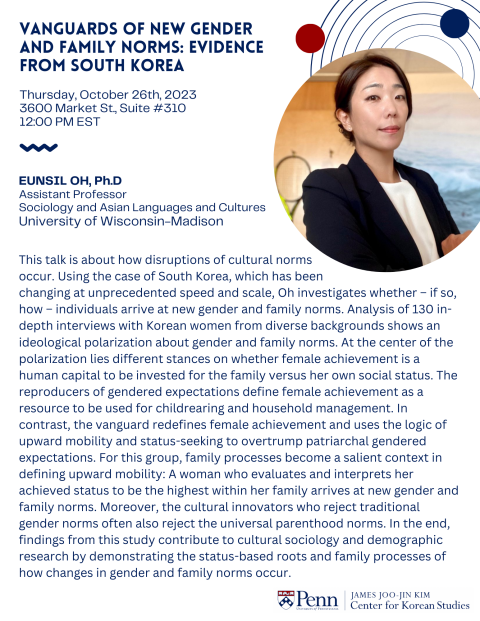
Korean Studies Colloquium
3600 Market Street, Suite #310
Philadelphia, PA 19104
This talk is about how disruptions of cultural norms occur. Using the case of South Korea, which has been changing at unprecedented speed and scale, Oh investigates whether – if so, how – individuals arrive at new gender and family norms. Analysis of 130 in-depth interviews with Korean women from diverse backgrounds shows an ideological polarization about gender and family norms. At the center of the polarization lies different stances on whether female achievement is a human capital to be invested for the family versus her own social status. The reproducers of gendered expectations define female achievement as a resource to be used for childrearing and household management. In contrast, the vanguard redefines female achievement and uses the logic of upward mobility and status-seeking to overtrump patriarchal gendered expectations. For this group, family processes become a salient context in defining upward mobility: A woman who evaluates and interprets her achieved status to be the highest within her family arrives at new gender and family norms. Moreover, the cultural innovators who reject traditional gender norms often also reject the universal parenthood norms. In the end, findings from this study contribute to cultural sociology and demographic research by demonstrating the status-based roots and family processes of how changes in gender and family norms occur.
Eunsil Oh is an assistant professor at the University of Wisconsin-Madison. Oh conducts research on gender, work, and family in the context of East Asia. Using qualitative methods, she investigates cultural and structural foundations of work and family decision-making processes. Current projects include research that investigates the relationship between social change and social norms in East Asia and the low fertility patterns in South Korea. Before joining the Department of Sociology at UW-Madison, Oh earned a Ph.D. in Sociology at Harvard University.
 James Joo-Jin Kim Center for Korean Studies
James Joo-Jin Kim Center for Korean Studies